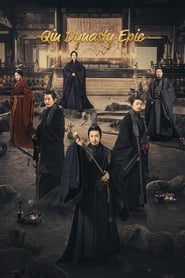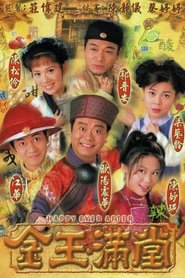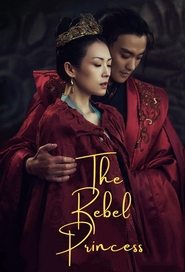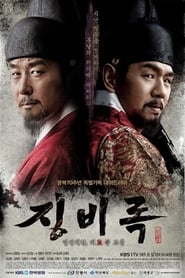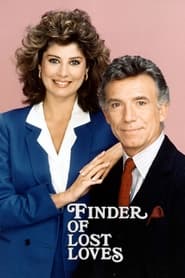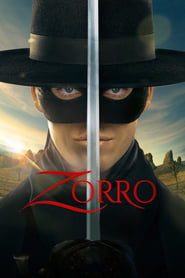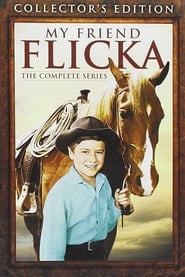Popular Romance TV Series - Page 363
-
Qin Dynasty Epic
2020
Qin Dynasty Epic
2020
star 7.8During the late stages of the Warring States era of the Qin state, Ying Zheng, Lu Bu Wei, Li Si, Wang Jian and many formidable politicians work together to unite the six states under one rule. -
Warriors Within
2020
Warriors Within
2020
Twenty years ago, Takeda Kunizen secretly saw his father presenting a scroll to his younger brother Kosho. Kokatsu believed that the scroll contained "martial arts secret techniques". One day, a new immigrant, Xiaoyue, was bullied. A quasi-Olympic karate player, Zhuang Hui, got involved. Zhihao, a gangster who was put on a horse by a gangster, was involved. He was just passing by to stop the fight. -
Happy Ever After
1999
Happy Ever After
1999
star 5Happy Ever After is a 1999 Hong Kong grand-production television period drama. A TVB production, the drama was produced by Chong Wai-kin, written by Chan Ching-yee and Choi Ting-ting, and stars an ensemble cast. The drama is set during the reign of the Qianlong Emperor of Late Imperial China's Qing dynasty. The drama tells of a story regarding the struggles of a poor chef and his best friend earning an opportunity to serve the Qianlong Emperor, also befriending the emperor along the way. The drama also places an emphasis on Chinese cuisine with documentations concerning the Manchu Han Imperial Feast. Happy Ever After acclaimed positive reviews from critics and was TVB's third highest-rating drama of 1999, peaking to 40 points. Happy Ever After was re-broadcast on the same channel in 2007 between January and March. -
Space: Above and Beyond
1995
star 7.2Set in the years 2063–2064, the show focuses on the "Wildcards", members of the United States Marine Corps Space Aviator Cavalry, 58th Squadron. They are stationed on the space carrier USS Saratoga, and act as infantry and pilots of SA-43 Endo/Exo-Atmospheric Attack Jet fighters. -
The Rebel Princess
2021
The Rebel Princess
2021
star 6.9Wang Xuan and Xiao Qi strike a deal for the sake of power. They marry first before falling in love and join hands to protect their homeland. She is a woman who is no less than any man while he rose from humble beginnings. The imperial family has become rotten to the core. The nobles are lavish with no regard for the people. Princess Wang Xuan and her childhood sweetheart, the third prince, become pawns of a prophecy that states, "to acquire thee is to obtain the world." Being pulled into the matters of the court, Wang Xuan is married off by her father to Xiao Qi who comes from a poor family. On the night of their wedding, Xiao Qi is forced to leave the capital. Wang Xuan is shamed and discouraged. The Helan Prince kidnaps Wang Xuan in order to seek revenge on Xiao Qi. The crisis they face becomes a blessing in disguise for the couple. Wang Xuan is moved and inspired by Xiao Qi's wish to bring peace and prosperity to the nation and they fall in love. -
Taste of Wife
2018
Taste of Wife
2018
Celebrity couples with varying culinary tastes and approaches to food seek the small joys of everyday living through cooking and eating. -
The Jingbirok: A Memoir of Imjin War
2015
star 3.4Jingbirok, the name of a book written by real-life Joseon historian and scholar Ryu Seong Ryong (Kim Sang Joong),detailing the Imjin War (1592-1598). The drama will be a telling of historical events with the scholar as the central character, in the samevein as “Jung Do Jun”(who influenced the founding of the Joseon dynasty). Ryu Seong Ryong was an official who served during King Seonjo’s reign in the late 16th century. He was a brilliant Confucian scholar who was put in charge of military operations during the Imjin War, and greatly influenced AdmiralLee Soon Shin. -
Finder of Lost Loves
1984
Finder of Lost Loves
1984
star 5.7The Finder of Lost Loves TV show was a 60 minute drama series on ABC about a private investigator who specialized in finding lost loves from the past for his heartbroken clients. -
Les Boys
2007
-
The Glory
2025
The Glory
2025
star 8.9Zhuang Hanyan, abandoned as a child and raised in the countryside, returns to her family in the capital, catching the attention of Fu Yunxi, a magistrate seeking a capable wife. As they grow closer, Hanyan finds warmth in family bonds as their relationship deepens. -
My Little One
2018
-
Alisa: Follow Your Heart
2009
star 3Alisa Lenz and luck? Her boyfriend cheats on her, then leaves her with a mountain of debts... She ruins her job application by angering the company's CEO... She loses the cut-glass pendant that was the only keepsake from her biological parents - and that was her good-luck charm... Decidedly, luck does not seem to smile on Alisa. But if you think this is enough to keep her from pursuing her goal of happiness and fulfillment, you don't know Alisa! -
Zorro
2024
Zorro
2024
star 7.4Diego de la Vega returns to California to avenge his father's murder. After assuming the title of Zorro, he confronts the Governor, the malevolent leader of the Chinese community and a secret society, placing the common good above all. -
Personal Taste
2010
Personal Taste
2010
star 7.9Jin-ho Jeon is a very stylish young man with the perfect looks. Jin-ho has also some faults which include being self-centered and obsession with cleanliness. Jin-ho Jeon then comes across Gae-in Park, a woman hurt by love and is now looking for a gay roommate/friend. Jin-ho wanting to live with the woman, then pretends to be a gay male. -
Divorce Attorney Shin
2023
star 8.1Driven by a personal tragedy, a pianist-turned-lawyer navigates the complex world of divorce — fighting for his clients to win by any means necessary. -
Su Ji and U Ri
2024
Su Ji and U Ri
2024
star 5.8A healing romance begins between fallen star doctor Jin Su Ji and stubborn newbie doctor Choi U Ri. -
Choujuu Sentai Liveman
1988
star 8.2Yusuke, Jo, Megumi, Kenji, Gou and Rui are students at Academia but the latter three decide to turn bad and join forces with the evil army Volt. When the defectors return, their three friends are forced to combat them as Choujuu Sentai Liveman. With the help of an android ally named Colon and a few others along the way, the Liveman must save the world and their friends. -
Veronica's Closet
1997
Veronica's Closet
1997
star 5.2Veronica 'Ronnie' Chase is the 'Queen of Romance.' Founder of a successful lingerie empire, and best-selling author of self-help romance books, Ronnie has it all ... money, success, sex appeal and a philandering husband. How she will find true happiness without jeopardizing her business will be her biggest challenge yet. -
The Rise of Phoenixes
2018
star 8When a secret from the past rears its head, respected warrior Feng Zhiwei is forced to choose between revenge and her loyalty to ruling prince Ning Yi. -
My Friend Flicka
1955
My Friend Flicka
1955
star 5.7My Friend Flicka is a 39-episode western television series set at the fictitious Goose Bar Ranch in Wyoming at the turn of the 20th century. The program was filmed in color but initially aired in black and white on CBS at 7:30 p.m. Fridays from February 10, 1956, to February 1, 1957. It was a mid-season replacement for Gene Autry's The Adventures of Champion. Both series, however failed in the ratings against ABC's The Adventures of Rin Tin Tin. After the initial Friday airing, viewers could still find the series on CBS Saturdays at 7 p.m. Eastern during March 1957, on Sundays at 6 p.m. from April to May 1957, and on Wednesdays at 7:30 p.m. from June to August 1957. NBC carried the program in color at 6:30 p.m. Sunday from September to December 1957 and at 7 p.m. Sunday from January to May 1958. In subsequent years, the series aired mostly on Saturday mornings on all networks. The Disney Channel ran it on Monday evenings in the mid-1980s. Over the years many viewers were unaware that the series produced episodes f
 Netflix
Netflix
 Amazon Prime Video
Amazon Prime Video
 Apple iTunes
Apple iTunes
 Apple TV Plus
Apple TV Plus
 Disney Plus
Disney Plus
 Google Play Movies
Google Play Movies
 Paramount Plus
Paramount Plus
 Hulu
Hulu
 HBO Max
HBO Max
 YouTube
YouTube
 fuboTV
fuboTV
 Peacock
Peacock
 Peacock Premium
Peacock Premium
 Amazon Video
Amazon Video
 The Roku Channel
The Roku Channel
 AMC+
AMC+
 Kocowa
Kocowa
 Hoopla
Hoopla
 The CW
The CW
 Vudu
Vudu
 Starz
Starz
 Showtime
Showtime
 PBS
PBS
 Pantaflix
Pantaflix
 FXNow
FXNow
 Tubi TV
Tubi TV
 Kanopy
Kanopy
 Comedy Central
Comedy Central
 Crunchyroll
Crunchyroll
 Microsoft Store
Microsoft Store
 Redbox
Redbox
 Sun Nxt
Sun Nxt
 ABC
ABC
 DIRECTV
DIRECTV
 Crackle
Crackle
 Fandor
Fandor
 Plex
Plex
